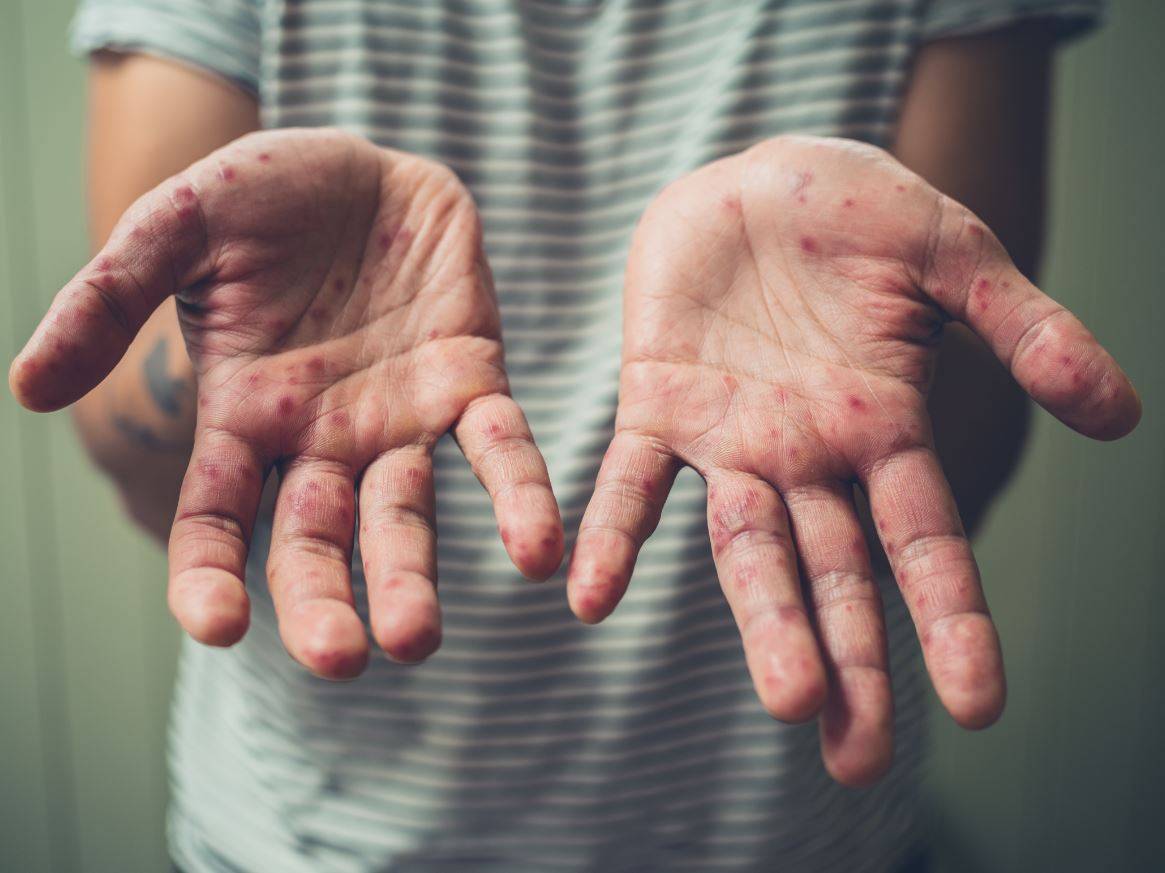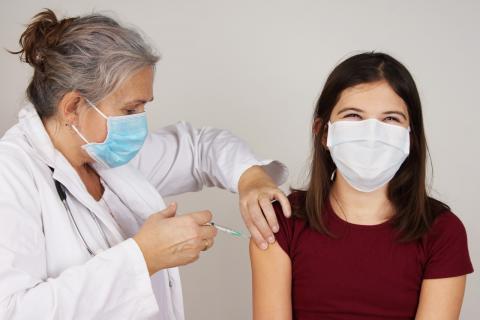Reactions: Spain detects first measles outbreaks since pandemic
Toledo and Alicante are suffering the first outbreaks of measles recorded in Spain since the pandemic, El País reported today. In total, 15 cases have been confirmed since 1 January, of which seven are imported and eight autochthonous.

Ignacio J. Molina - brotes sarampión EN
Ignacio J. Molina Pineda
Professor of Immunology and Director of the Department of Biochemistry and Molecular Biology 3 and Immunology at the University of Granada
Measles is a highly transmissible disease and to achieve interruption of transmission it is necessary to have vaccination rates above 95% of the population. The vaccine available to us is highly effective, but in recent years there has been a decline in vaccination rates. The hygienic and containment measures taken during the pandemic were also very effective, in a collateral way, against measles.
According to the European Centre for Disease Prevention and Control, there was a significant increase in measles throughout Europe in 2023, especially in Romania, Austria and Liechtenstein, although still far from the figures of 2009, which saw the last peak in incidence. The vast majority, up to 95 %, of the cases detected were in unvaccinated or inadequately immunised patients. While measles can lead to major complications that would require hospitalisation, it is necessary to remember the importance of maintaining proper immunisation in all people. The moment the vaccination rate drops, new cases will appear, which is exactly what is happening all over Europe and also in Spain.
Marcos López Hoyos - brotes sarampión EN
Marcos López Hoyos
Scientific Director of the Valdecilla Health Research Institute (IDIVAL), Head of the Immunology Department, and Professor of Immunology at the University of Cantabria-Marqués de Valdecilla University Hospital
Low vaccination rates in certain geographical areas result in numerous measles outbreaks. These cases are imported into our country when there is movement. Fortunately, we have a very high vaccination rate that serves as a defence barrier and prevents the spread of measles in our country. This news highlights the importance of vaccination as a means of preventing epidemics and the spread of infections that have almost been eradicated in our country.
África González - brotes sarampión EN
África González-Fernández
Professor of Immunology at the University of Vigo, researcher at CINBIO, and member of the RAFG
Measles has not disappeared from the world and, as long as it continues to circulate, we must be vigilant. It produces an infection that can range from mild to encephalitis, with significant sequelae and sometimes death. But there is also an effect it has on the immune system, which is to produce immunosuppression, and people can become infected with other pathogens (respiratory infections, diarrhoea, etc.), which can also be very serious. This effect produced by the measles virus has been called 'immunoamnesia' and can last for years after infection. This is because the virus, although it appears to infect the skin and is transmitted through the air, also affects the immune system, specifically by destroying immune memory cells.
Spain has a very good vaccination coverage of the recommended two doses, but this is not the case in other countries, and there may be imported cases or infection in people with a depressed immune system if they travel to countries where there is not good vaccination coverage. The people most at risk are very young children who have not yet been vaccinated and immunocompromised people.
So far it does not seem to be of concern in Spain, as these have been isolated outbreaks, and it is important to note that it has infected unvaccinated people.
Since the measles virus is highly contagious, almost 100% vaccination coverage is needed to control it. Anti-vaccine movements and religious groups are doing a lot of damage to measles control. It was already under control and it was even thought that it could be eradicated, but these movements led many families not to vaccinate their children in several countries (Israel, USA, France...), increasing measles cases in their countries very significantly, and with outbreaks in other countries due to the movement of infected people.
We must call for calm, but also for the responsibility of all families to vaccinate their children, as they will be protecting them from a disease which, believe it or not, can be serious.
The World Health Organisation has warned that measles is on the rise following the covid-19 pandemic, as many children around the world have not been vaccinated.
The US has had several outbreaks in different states, especially in 2019, which led the authorities to recommend measles vaccination [see the graphic included in the link].
Quique Bassat - brotes sarampión EN
Quique Bassat
Director General and ICREA Research Professor at the Barcelona Institute for Global Health (ISGlobal)
Without wishing to alarm anyone, the cases of measles detected in Spain, as well as those of other vaccine-preventable infectious diseases, are related to the anomalies in circulation and transmission of pathogens experienced during the pandemic. These effects, described in the literature, for example, for respiratory syncytial virus (RSV), have to do with a greater - albeit temporary - vulnerability of certain populations to infection after having had little exposure during the pandemic years. The best protection in these cases is to reinforce vaccination schedules and coverage, at least for those infectious diseases for which vaccines are available.
Rial - sarampión
José Gómez Rial
Head of the Immunology Department at the Complejo Hospitalario Universitario de Santiago de Compostela (CHUS), Servicio Gallego de Salud (SERGAS)
After the outbreaks in Europe and the United States, it's now our country's turn to suffer the first measles outbreaks since the pandemic. Although our country has a high vaccination coverage for the first dose (97.2%), the coverage for the second dose drops to 93.2%, well below the stated target of 95% necessary to contain the disease. This indicates that we cannot relax regarding vaccination recommendations and the importance of completing the two-dose regimen to keep this extremely contagious virus at bay, which also has a very dangerous immunological effect known as "immune amnesia." This virus infects immune memory cells, "resetting" all the acquired memory up to that point in the individual, making them more susceptible to other infections due to this temporary loss of memory.
Therefore, it is crucial to reinforce the importance of vaccination so that diseases that had been forgotten do not return due to the relaxation resulting from the perception of low risk.
Ángel - sarampión
Ángel Hernández Merino
Pediatrician and collaborator of the Advisory Committee on Vaccines, the Spanish Association of Pediatrics and the Spanish Association of Primary Care Pediatrics
From different sources, there have been warnings of a resurgence of measles in recent months. This is happening in Europe, particularly in the United Kingdom, where 650 cases have been confirmed from October 1, 2023, to the end of February 2024, with 183 new cases in February alone.
It is logical to observe the same phenomenon in Spain, given the extraordinary contagiousness of measles and the very high mobility and interconnections of populations in Europe. In 2020, with the emergence of the pandemic, measles cases decreased to almost disappear (see image here, where it is observed that new cases ceased from March of that year), they remained at very low levels from 2021 to 2023. And now, in these first weeks of 2024, an increase in cases is beginning to be noticed.
The figures observed in Spain are still moderate, but they will surely increase, as in other countries.
In Spain, two circumstances should be considered:
- The favorable circumstance is that vaccination coverage is generally good, although improvable (see here). Speaking of coverage with two doses, it globally reaches 93.9%, below the target (95%), with Andalusia, Aragon, Asturias, Cantabria, Valencian Community, Murcia, and Navarra above the mentioned target. And below 90% (high risk) are: Castilla-La Mancha, Basque Country, La Rioja, Ceuta, and Melilla (Canary Islands and Extremadura only a few tenths above this figure). The Basque Country's figure of only 88% is extraordinarily worrying. Meanwhile, the Balearic Islands do not provide data (?).
- These coverage figures - good, but not so much - have at least two weaknesses, moreover: one, the delay in the registration of vaccination compliance, generally 1-2 years, so it is showing us an already "old" reality, a picture from 1-2 years ago, and we do not know the current reality; and two, the figures with geographical reference of autonomous community cover up the possible (real, according to numerous studies) variability of coverage in smaller areas and collectives, that is, it does not reveal the existing pockets of under-vaccination.
Finally, it is also relevant to mention that measles diagnoses could be escaping. That is to say, there may be more cases than those identified. The ISCIII report of 2022 states that, in our environment, the quality indicators of measles surveillance are not good in some of them: in 2022, the proposed objectives were achieved with the exception of the discarded cases rate; the target proposed by the WHO-Europe is ≥2 per 100,000 inhabitants, and the result achieved in Spain in 2022 has been only 0.4 discarded cases per 100,000 inhabitants (ISCIII Report, 2022). As this same report indicates, the sensitivity of the system for identifying and reporting suspected cases (basically the responsibility of the clinical services of the NHS) is failing, while the subsequent management of suspected cases once they reach the epidemiology services is correct.
In conclusion, it can be said that we will likely witness an increase in measles cases and that we face the challenges of: 1) improving and maintaining vaccination coverage and its monitoring; and 2) improving the capacity to recognize measles cases in the healthcare system.



